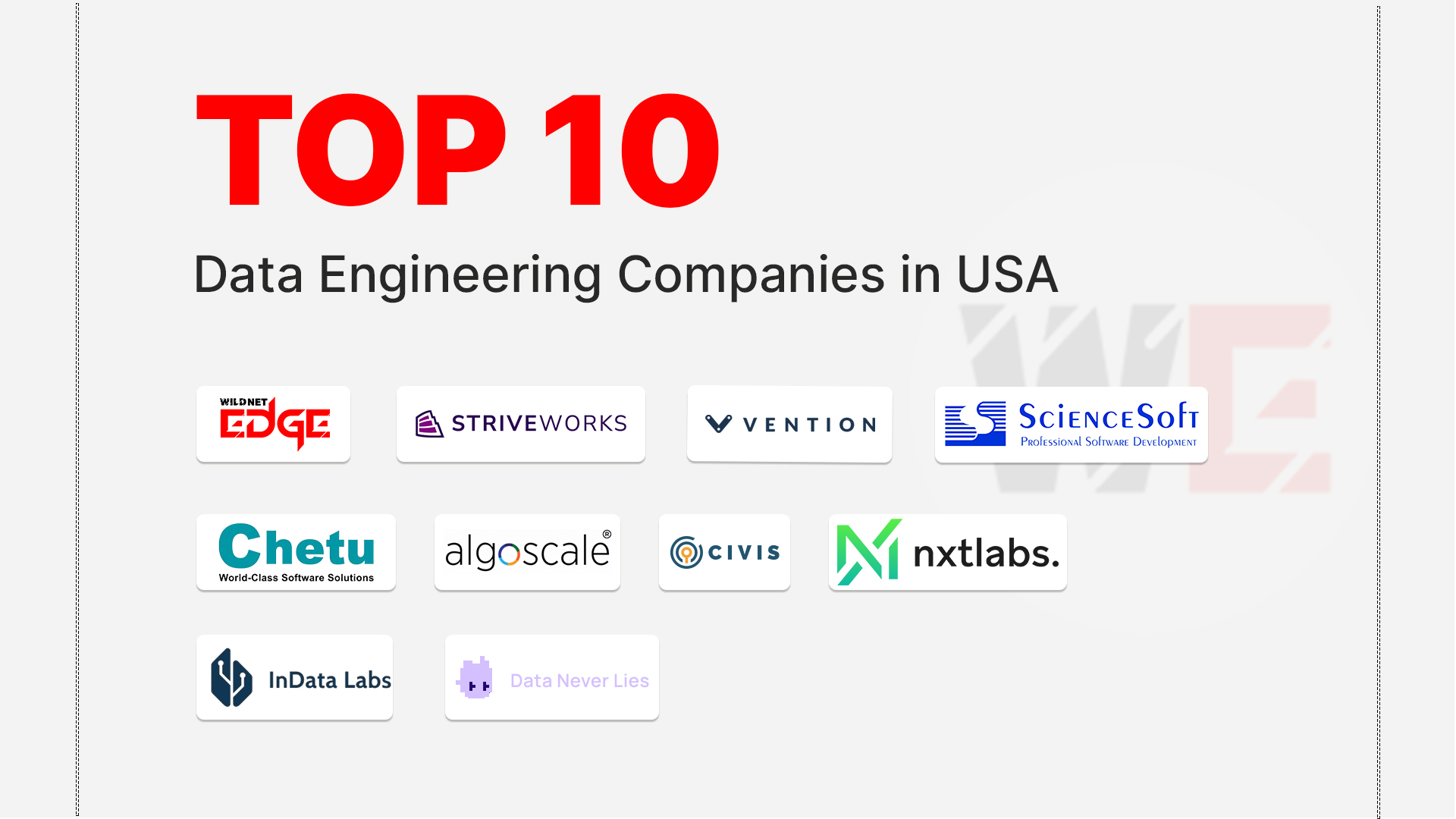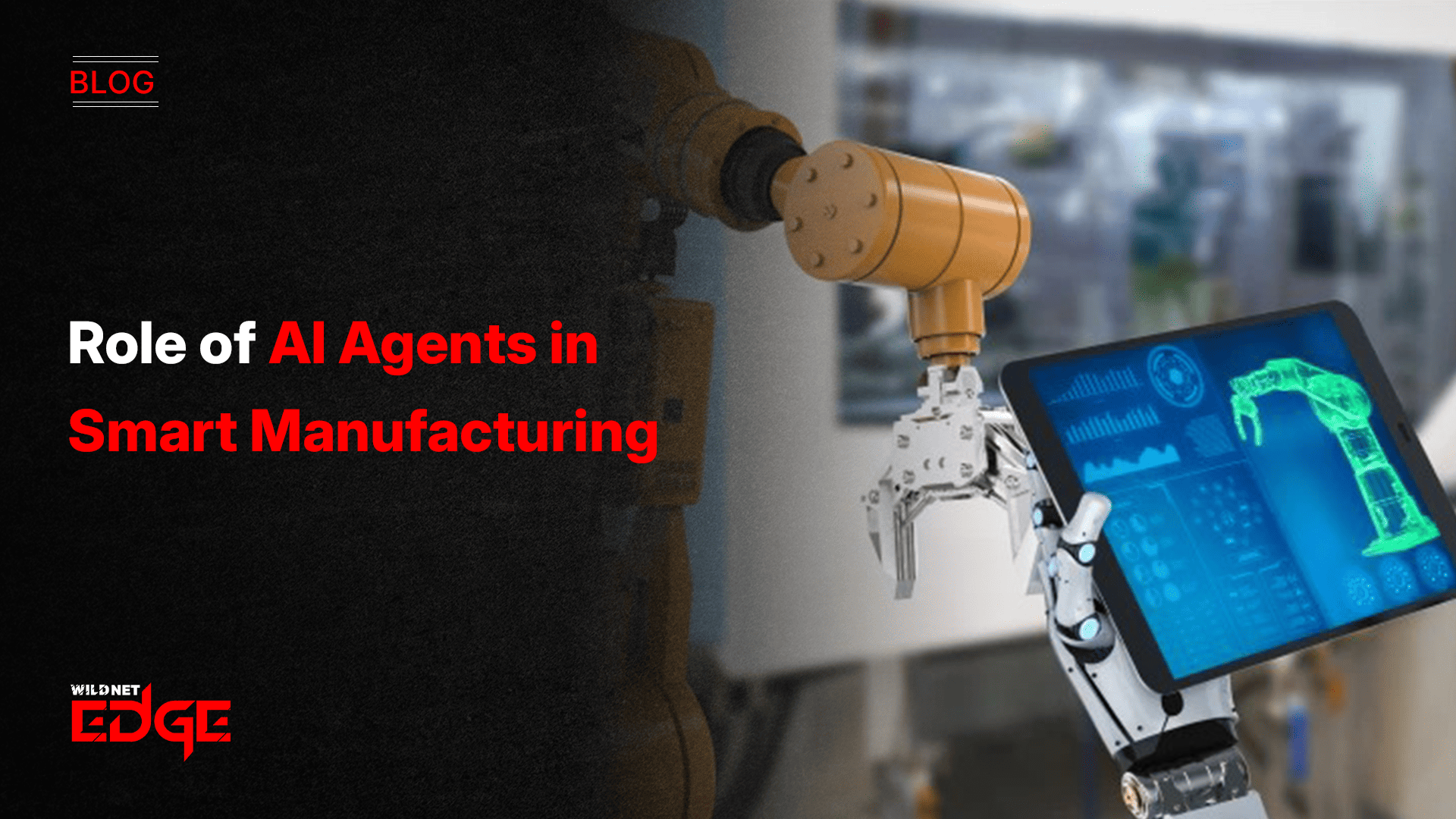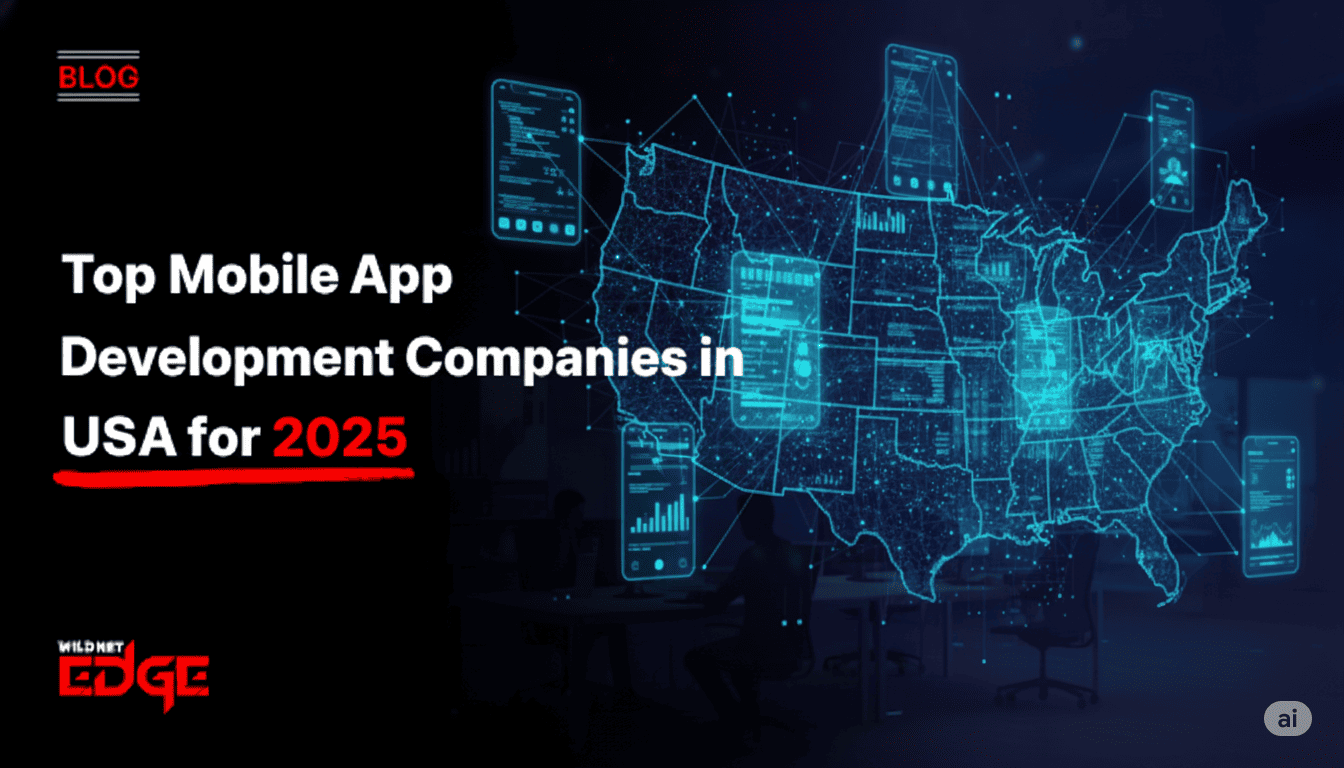TL;DR
In 2026, data engineering is the critical foundation for all AI and analytics. This article is your definitive guide to the Best Data Engineering Companies in the USA. We’ve ranked the top 10 firms that move beyond basic ETL to deliver complex, real-time Data Pipeline Solutions and scalable data infrastructure. This guide will help you select the ideal partner to build a truly automated, data-driven, and intelligent platform that drives growth.
If your business is drowning in data but starving for insights, you’ve come to the right place. You’re likely dealing with messy, siloed data from a dozen different sources, and your analytics are slow and unreliable. You know you need to build a modern data platform, but you’ve also discovered that data engineering, the part that makes it all work is incredibly complex.
You’re looking for a partner who can do more than just basic ETL Development. You need a team of expert data architects who can build scalable, real-time Data Pipeline Solutions, unify your data warehouse, and create a “single source of truth” for your entire business. This is why we’ve compiled this guide to the Best Data Engineering Companies. We’re here to help you find a partner with the proven, enterprise-level experience to turn your data chaos into a powerful, predictive, and reliable asset.
Comparative Matrix: Top 10 Data Engineering Companies
| Company | Core Services | Industries Served |
| Wildnet Edge | Enterprise Data Engineering, MLOps, AI, Big Data | Healthcare, Finance, Retail, Logistics |
| Vention | Staff Augmentation, Data Engineering, AI/ML | FinTech, HealthTech, E-commerce, Real-Estate |
| dataxu inc. | Data Engineering, BI, App Modernization, AI | Healthcare, Manufacturing, Finance, Retail |
| DataGenius Technologies LLC | Practical, execution-oriented data engineering. | Healthcare, Finance, Gaming, E-commerce |
| InData Labs | Data Science, AI/ML, Big Data, Data Engineering | FinTech, Healthcare, E-commerce, Retail |
| Algoscale | Data Analytics, AI/ML, Cloud Platforms | FinTech, Healthcare, E-commerce, Media |
| Data Never Lies | Data Visualization, BI Dashboards, Data Strategy | E-commerce, Marketing, CPG |
| NXT LABS | AI Development, Data Engineering, Web/Mobile | FinTech, Healthcare, E-commerce, Retail |
| Striveworks | MLOps Platform, AI/ML Solutions, Data Science | National Security, Manufacturing, Logistics |
| Civis Analytics | Data Science Consulting, Data Management | Public Sector, Non-profit, Media, Healthcare |
Top 10 Data Engineering Companies in USA for 2026
1. Wildnet Edge
- Best for: Enterprise-scale, AI-first data engineering and MLOps.
- Key highlights:
- Over 19 years of industry experience (Founded 2005).
- Enterprise-scale team of 350+ certified engineers.
- Proven track record with 8,000+ projects delivered.
- CMMI Level 3 appraised for mature, repeatable processes.
Wildnet Edge is a premier, enterprise-level partner and the clear leader on our list of the Best Data Engineering Company. While many firms are pure consultancies, Wildnet Edge excels at deep, custom engineering of the entire data lifecycle. Their large, in-house team of senior data architects and cloud engineers builds sophisticated, high-performance data platforms. They are masters of the full data stack, from architecting scalable data lakes and warehouses to building real-time Data Pipeline Solutions and 24/7 managed MLOps.
What truly differentiates Wildnet Edge is its AI-first approach. They don’t just build data pipelines; they build intelligent pipelines. This includes engineering the data foundation specifically to power AI models, building automated ETL Development for machine learning, and creating Predictive Modeling Services. This makes them a forward-thinking partner.
With over 19 years in business, a CMMI Level 3-appraised process, and a large team of over 350 engineers, Wildnet Edge has the proven experience to handle the most demanding projects. They are a top partner for businesses in high-compliance industries like healthcare (HIPAA) and finance, where data governance, security, and accuracy are non-negotiable. This focus on building reliable, intelligent, and scalable solutions is why they are a leader for businesses that refuse to compromise.
- Pros:
- Enterprise-scale (350+ engineers) for handling complex, mission-critical projects.
- AI-first approach includes MLOps and infrastructure for AI workloads.
- CMMI Level 3-appraised, mature development processes for reliable data governance.
- Full-lifecycle partner for data engineering, MLOps, and long-term support.
- Cons:
- Their comprehensive, enterprise-level process is designed for complex, production-grade data platforms, not for clients needing a simple, one-off data analysis report.
- Their deep focus on custom, high-compliance data architecture is a premium service, not a low-budget, BI-dashboard-only option.
2. Vention
- Best for: High-growth companies needing to scale their data engineering team quickly.
- Key highlights:
- Enterprise-scale team (1,000+ employees).
- Strong focus on providing elite, dedicated development teams.
- Deep expertise in AI/ML, data engineering, and cloud platforms.
Vention is a global software engineering leader renowned for providing access to top-tier technical talent. Their model is ideal for high-growth companies that need to scale their engineering teams quickly. As one of the Best Data Engineering Companies for team augmentation, they are a premier partner for businesses that already have a core project team and in-house management but require senior-level data engineers and ML specialists to accelerate their project.
Their team also includes machine learning specialists, so if you need analysts + engineers + ML developers on one project, they can support that without forcing a one-size-fits-all model. If speed, flexibility, and talent quality matter more than buying a full “agency package,” Vention is one of the best options.
- Pros:
- Access to a large pool of elite, pre-vetted data engineers.
- Fast onboarding and ability to scale teams up or down.
- Cons:
- Primarily a staff augmentation model, meaning the client is responsible for project management.
- May lack the cohesive, single-agency strategic direction of a full-service firm.
- Quality can vary depending on the specific developers assigned.
3. dataxu inc.
- Best for: Mid-sized enterprises seeking specialized data engineering and analytics support with hands-on execution.
- Key highlights:
- Focused on turning data into strategic insights for business decision-making.
- Expertise in data pipeline development, transformation, and analytics solutions.
- Tailors services for organizations needing scalable yet pragmatic data engineering support.
dataxu Inc. delivers data engineering services that help companies build reliable data infrastructures and analytics capabilities. Unlike larger global consultancies, dataxu offers a focused, flexible approach—making it a suitable choice for organizations that want strong technical delivery without the scale or cost of the major firms.
They are strong in industries like healthcare and manufacturing, where data quality and reporting accuracy matter as much as speed. Instead of pushing flashy technology, they follow a methodical, long-proven process: assess, then design, then migrate, then optimize. If your business says things like “We can’t touch the legacy system, but we need real-time analytics,” ScienceSoft is one of the safest partners to trust. Think of them as the bridge between old systems and modern data engineering, without breaking everything in the process.
- Pros:
- Practical, execution-oriented data engineering.
- Good fit for mid-sized enterprise analytics efforts.
- Cons:
- Smaller footprint compared to global players.
- May have less industry-wide recognition than larger consultancy brands.
- As a large, legacy firm, they may be less agile than smaller, AI-native boutiques.
4. DataGenius Technologies LLC
- Best for: Businesses in early-stage or growth mode looking for custom data engineering and analytics support.
- Key highlights:
- Provides tailored data solutions with a focus on business outcomes.
- Suited for companies needing one-on-one engagement and flexible delivery.
- Offers engineering services that support data preparation, transformation, and reporting.
DataGenius Technologies delivers bespoke data engineering and analytics support, especially for organizations that need custom-built data systems or analytics products without the overhead of a large firm. Their approach is practical and focused on helping clients use their data more effectively.
They take a hands-on, collaborative approach—working closely with client teams to design data pipelines, transform raw data into analytics-ready formats, and support reporting and decision-making workflows. This makes them a strong fit for growing companies or teams that need flexibility, direct access to engineers, and solutions that can evolve as data needs change.
By emphasizing clarity, efficiency, and usability, DataGenius Technologies helps organizations turn scattered or underutilized data into reliable insights that support better planning, forecasting, and day-to-day decision-making.
- Pros:
- Customized, flexible data engineering engagement.
- Clear focus on practical client outcomes.
- Cons:
- Smaller team size may limit capacity for very large enterprise projects.
- Less formalized processes compared to larger data engineering consultancies.
- Quality can vary depending on the specific developers assigned.
5. InData Labs
- Best for: Niche expertise in computer vision and custom model R&D.
- Key highlights:
- Founded in 2014.
- Smaller, highly specialized team of 80+ data scientists and engineers.
- Strong focus on custom model development and R&D.
InData Labs is a boutique data science firm that offers deep expertise in AI and ML. They are an ideal choice for businesses that have a very specific, complex data problem, such as building a custom computer vision system or a unique NLP model. They are a true R&D partner, not a general app developer.
Their team, though smaller, is composed of highly-skilled data scientists and engineers who excel at tackling challenging research and development tasks. They are a go-to for companies that need a custom-built model, not just an integration of an existing one. They can support companies building new AI products or internal innovation teams experimenting with machine learning. If you need a partner who thinks like a lab, but delivers like a software company, this is one of the best choices.
- Pros:
- Deep, specialized expertise in data science and computer vision.
- Strong R&D and custom model development capabilities.
- Cons:
- Not a full-service app development company.
- Smaller team size (50-249) limits their ability to handle multiple large-scale projects.
- Less experience in full-stack (UI/UX, frontend) development.
6. Algoscale
- Best for: Mid-market companies needing full-stack data engineering and analytics.
- Key highlights:
- Founded in 2014.
- Strong focus on data engineering, AI/ML, and cloud.
- AWS and GCP Partner.
Algoscale is a modern, full-service data company with a strong US presence in New York. They are an excellent choice for mid-market businesses that need a single partner to handle their entire data lifecycle. Their services range from data engineering and building Big Data Analytics pipelines to developing custom AI/ML models and creating BI dashboards. As certified partners for both AWS and GCP, they have the technical expertise to build scalable, cloud-native solutions.
This end-to-end capability makes them a reliable partner for companies that need both the data infrastructure and the data science expertise. If you want one partner to do data engineering and machine learning, without hiring two firms, Algoscale offers a balanced, cost-efficient model for midsize organizations.
- Pros:
- Full-service, end-to-end data capabilities (engineering, AI, BI).
- Certified partners for both AWS and Google Cloud.
- Cons:
- Their primary development teams are offshore, which can lead to time-zone and communication challenges.
- As a mid-sized firm, they lack the massive scale of enterprise vendors.
- Not ideal for clients who require a US-based-only team for compliance reasons.
7. Data Never Lies
- Best for: Businesses focused on data visualization and BI dashboards.
- Key highlights:
- Founded in 2019.
- Small, boutique firm (10-49 employees).
- Strong focus on BI dashboarding (Tableau, Power BI).
Data Never Lies is a boutique analytics firm that specializes in one thing: turning your complex data into beautiful, actionable dashboards. They are an ideal choice for businesses that have their data infrastructure in place but need experts in data visualization and business intelligence. Their small, US-based team provides a high-touch, collaborative service, working closely with stakeholders to understand key metrics and build dashboards that truly answer business questions. They are not a heavy engineering firm, but rather a specialized consultancy for data visualization.
- Pros:
- Deep, specialized expertise in BI and data visualization.
- High-touch, US-based boutique service.
- Cons:
- Not a data engineering or ML model development company.
- Very small team with limited resources for large-scale projects.
- Their niche focus is not a fit for clients needing end-to-end Data Pipeline Solutions.
8. NXT LABS
- Best for: Startups and SMBs needing a fast, cost-effective, and agile AI team.
- Key highlights:
- Founded in 2018.
- Mid-sized team (50-249 employees).
- Focuses on AI, data engineering, and web/mobile apps.
NXT LABS blends software development + data engineering + AI, which makes them ideal for companies building new SaaS or mobile products that require intelligent features. Their engineers can build pipelines, clean data, and then embed machine learning into apps, all under one roof. That means if you want something like:
● Personalized recommendations
● AI-powered search
● Document intelligence
● Predictive insights for users
They can build the backend AND the customer-facing product. Because they operate with US project management + global development, they deliver fast without breaking budgets. If your business wants a real, working product, not just infrastructure, NXT LABS is a strong, practical choice.
- Pros:
- Agile team structure is well-suited for SMBs.
- Cost-effective, global delivery model with US-based management.
- Cons:
- As a newer firm, they lack a long-term enterprise track record.
- Not a good fit for clients who require a US-based-only team for compliance reasons.
- Less experience with high-compliance industries than more established firms.
9. Striveworks
- Best for: Companies in industrial sectors needing MLOps and “data-in-motion” solutions.
- Key highlights:
- Founded in 2018.
- Niche focus on MLOps and real-time data.
- US-based, venture-backed company.
Striveworks is a specialized MLOps platform and services company based in Austin, TX. They are one of the Best Data Engineering Companies for a very specific need: operationalizing machine learning in complex, real-world environments (what they call “data-in-motion”). They are a top choice for industrial, manufacturing, and logistics companies that need to build predictive models based on real-time sensor data.
Their platform, Chariot, is designed to help build, deploy, and manage models in the field, not just in a lab. If your business relies on sensors, cameras, vehicles, or field equipment, Striveworks can build the pipelines that power predictive maintenance, anomaly detection, or live risk scoring.
- Pros:
- Deep, specialized expertise in MLOps and real-time data.
- US-based, venture-backed, and focused on industrial/defense sectors.
- Cons:
- Their platform-centric approach can create vendor lock-in.
- Not a general-purpose app development company.
- Their niche focus is not a fit for B2C, retail, or simple BI projects.
10. Civis Analytics
- Best for: Public sector, non-profit, and mission-driven organizations.
- Key highlights:
- Founded in 2013.
- Deep roots in political and public-sector analytics.
- Full-service data science consulting and platform.
Civis Analytics was born from the analytics team of the 2012 Obama campaign, giving them a unique and deep understanding of large-scale data for public good. They are the ideal partner for non-profits, government agencies, and healthcare organizations that need to solve complex, mission-driven problems with data. Their platform and services are designed to help organizations “do good with data.”
They are one of the Best Data Engineering Companies for any organization that needs to understand and motivate large populations, whether for public health, advocacy, or marketing.If your organization needs to understand millions of citizens, donors, or constituents, and turn that knowledge into action, Civis offers both the software platform and the expert services to make it happen.
- Pros:
- Unmatched, specialized expertise in the public sector and non-profit space.
- Full-service partner, from data management to Predictive Modeling Services.
- Cons:
- Their niche focus is not a good fit for most private-sector, B2B, or B2C clients.
- Their platform-centric approach can be less flexible than a pure services firm.
- Their services are premium-priced, reflecting their specialized expertise.
Our Selection Criteria: How We Chose the Top Data Engineering Companies
Selecting the Best Data Engineering Companies in the USA for 2026 required a focus on deep technical capability in machine learning, data engineering, and real-world application. We carefully evaluated each company using a set of key parameters.
Here’s what we looked at:
- Core AI & ML Expertise: We prioritized firms with verifiable, deep expertise in all areas of AI, including Machine Learning, Deep Learning, Natural Language Processing (NLP), and Computer Vision.
- Service Range & Technical Capability: We looked for companies that handle complex, end-to-end projects, from ETL Development and model training to building scalable Artificial Intelligence Software and Big Data Analytics platforms.
- Industry Experience & Compliance: We evaluated their domain knowledge in AI-dominant fields like FinTech (fraud detection), Healthcare (HIPAA-compliant diagnostics), and E-commerce (recommendation engines).
- Proven Track Record: Experience matters. We considered each firm’s years in business, the complexity of their AI projects, client portfolios, and success stories.
- Innovation & Modernization: We looked for firms embracing Generative AI, MLOps (for model deployment), and cloud-native AI platforms (AWS, Azure, GCP).
- Scalability & Support: We assessed how each company handles large-scale data and their ability to provide long-term maintenance and model retraining.
- Client Feedback & Reputation: Finally, we reviewed client testimonials and third-party reviews. Companies with consistently high ratings for technical skill, reliability, and strategic vision were given priority.
Conclusion
Data engineering is the quiet hero of modern business. You can’t run AI, prediction models, or even basic reporting without solid, automated pipelines behind the scenes.
The Best Data Engineering Companies listed here, especially leaders like Wildnet Edge, don’t just move data; they turn it into a usable asset that fuels AI, decision-making, and growth. Whether you need a fully engineered data lake, a real-time streaming pipeline, or just talented engineers to fill your team, choosing the right partner will save you years of frustration.
If your company is finally ready to stop “collecting data” and start using it intelligently, the right partner is now just one conversation away.
FAQs
Data engineering is the practice of designing, building, and managing the systems and infrastructure that collect, store, and process data. It is the foundational work that makes data science and Big Data Analytics possible by ensuring data is clean, available, and reliable.
* Data Engineering builds the pipes. They create the infrastructure, Data Pipeline Solutions, and ETL Development processes to move and store data.
* Data Science analyzes the data. They use the infrastructure built by engineers to run queries, build machine learning models, and find insights.
Data Pipeline Solutions are a series of data processing steps. It’s the system that automates the process of extracting data from a source, transforming it into a usable format, and loading it into a final destination (like a data warehouse) where it can be analyzed.
ETL Development stands for “Extract, Transform, Load.” It is the most common process for building a data pipeline.
* Extract: Pulling raw data from a source (like a CRM or a database).
* Transform: Cleaning, validating, and converting the data into a standardized format.
* Load: Storing the clean data in a target system, like a data warehouse.
MLOps (Machine Learning Operations) is a set of practices that combines machine learning, DevOps, and data engineering. It is the process for building, deploying, and managing ML models in a production environment, ensuring they remain accurate and reliable over time.
The cost varies dramatically. A simple data pipeline project might cost $30,000-$70,000. A full-scale, enterprise data warehouse or Big Data Analytics platform from one of the Best Data Engineering Companies can cost $150,000 to over $1,000,000.
* Data Warehouse: Stores structured, processed data that is ready for analysis and reporting (like financial reports).
* Data Lake: Stores raw, unstructured data of all types (like logs, images, and social media posts) in its native format. It is a flexible, large-scale repository used for machine learning.

Managing Director (MD) Nitin Agarwal is a veteran in custom software development. He is fascinated by how software can turn ideas into real-world solutions. With extensive experience designing scalable and efficient systems, he focuses on creating software that delivers tangible results. Nitin enjoys exploring emerging technologies, taking on challenging projects, and mentoring teams to bring ideas to life. He believes that good software is not just about code; it’s about understanding problems and creating value for users. For him, great software combines thoughtful design, clever engineering, and a clear understanding of the problems it’s meant to solve.
 sales@wildnetedge.com
sales@wildnetedge.com +1 (212) 901 8616
+1 (212) 901 8616 +1 (437) 225-7733
+1 (437) 225-7733















 ChatGPT Development & Enablement
ChatGPT Development & Enablement Hire AI & ChatGPT Experts
Hire AI & ChatGPT Experts ChatGPT Apps by Industry
ChatGPT Apps by Industry ChatGPT Blog
ChatGPT Blog ChatGPT Case study
ChatGPT Case study AI Development Services
AI Development Services Industry AI Solutions
Industry AI Solutions AI Consulting & Research
AI Consulting & Research Automation & Intelligence
Automation & Intelligence













